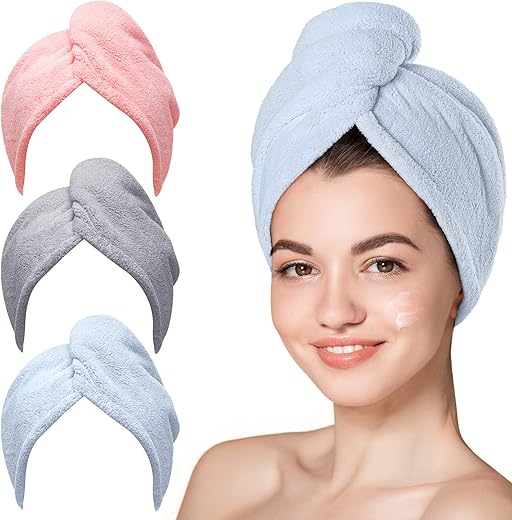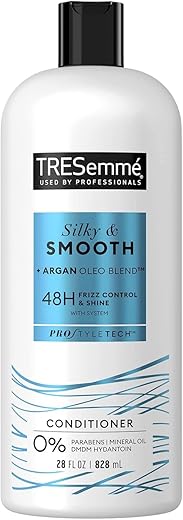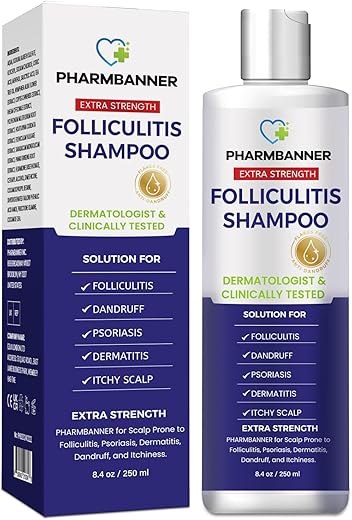
How Does Hair Conditioner Moisturize Your Hair?
We’ve all experienced the frustration of dry, frizzy hair that seems impossible to manage. You’ve probably tried countless products promising to restore moisture and nourish your locks, but have you ever wondered how these hair conditioners actually work? In this blog post, we’ll delve into the science behind hair conditioner and uncover the secrets to achieving luscious, hydrated hair. Whether you’re a beauty enthusiast or simply looking for a solution to your hair woes, this post is for you. Get ready to discover the magic that lies within that bottle of conditioner.
Top-Rated Hair Conditioner Moisturizers



What is Hair Conditioner?
Hair conditioner is a hair care product that is designed to improve the overall health and appearance of your hair. It is an essential part of any hair care routine and is used after shampooing to provide moisture, nourishment, and protection to the hair strands.



How is Hair Conditioner Different from Other Hair Care Products?
Hair conditioner is often confused with other hair care products such as hair masks, leave-in conditioners, and serums. While these products may have similar benefits, they are formulated differently and serve different purposes.
- Hair Masks: Hair masks are typically more concentrated and are used as a deep conditioning treatment. They are applied to the hair and left on for a longer period of time to provide intense hydration and repair damaged hair.
- Leave-in Conditioners: Leave-in conditioners are applied to the hair and left on without rinsing. They provide long-lasting moisture and detangling benefits, making them ideal for individuals with dry or frizzy hair.
- Serums: Hair serums are lightweight products that are used to smooth frizz, add shine, and protect the hair from heat damage. They are typically applied to damp or dry hair and provide instant results.
The Primary Function of Hair Conditioner
The primary function of hair conditioner is to replenish moisture that may have been stripped away during the shampooing process. It helps to restore the natural oils in the hair, leaving it soft, smooth, and manageable. Here are some key benefits of using hair conditioner:
- Hydration: Hair conditioners are formulated with ingredients such as oils, butters, and humectants that help to hydrate the hair and prevent dryness.
- Detangling: Conditioners contain ingredients that help to detangle the hair, making it easier to comb or brush through without causing breakage or damage.
- Protection: Conditioners create a protective barrier around the hair strands, shielding them from external factors such as pollution, UV rays, and heat styling tools.
- Repair: Many conditioners contain ingredients that can repair damaged hair, such as proteins and amino acids. These ingredients help to strengthen the hair shaft and reduce breakage.
- Improves Appearance: Regular use of hair conditioner can improve the overall appearance of your hair, making it look shinier, smoother, and more vibrant.
Why is Hair Conditioner Necessary?
Using hair conditioner is necessary for maintaining healthy and moisturized hair. Here are some reasons why incorporating a conditioner into your hair care routine is essential:
- Restores Moisture: Shampooing can strip away the natural oils in the hair, leaving it dry and prone to breakage. Conditioner helps to replenish this moisture, keeping the hair hydrated and preventing it from becoming brittle.
- Enhances Manageability: Conditioners make the hair easier to comb, brush, and style, reducing the risk of tangles and breakage. This makes it easier to achieve the desired hairstyle and prevents unnecessary damage to the hair.
- Prevents Damage: Conditioners create a protective layer on the hair, shielding it from environmental factors and heat styling tools. This helps to prevent damage and keeps the hair healthy and strong.
- Improves Texture and Appearance: Regular use of conditioner can significantly improve the texture and appearance of your hair. It adds shine, reduces frizz, and makes the hair look healthier and more vibrant.
In conclusion, hair conditioner is an essential component of any hair care routine. It provides moisture, nourishment, and protection to the hair, helping to maintain its health, manageability, and appearance. By incorporating a conditioner into your hair care routine, you can achieve the beautiful, healthy hair you’ve always wanted.
How Does Hair Conditioner Work?
Hair conditioner is an essential part of our hair care routine. We use it to moisturize and nourish our hair, making it soft, smooth, and manageable. But have you ever wondered how hair conditioner actually works? In this blog post, we will delve into the science behind hair conditioner and explain the key ingredients and processes involved.



The Role of Ingredients
Hair conditioners are formulated with various ingredients that work together to improve the overall condition of our hair. Let’s take a closer look at some of the key ingredients and their roles:
- Emollients: Emollients are moisturizing agents that help to soften and smooth the hair. They penetrate the hair shaft, filling in gaps and reducing frizz and flyaways. Common emollients found in hair conditioners include oils like coconut oil, argan oil, and jojoba oil.
- Humectants: Humectants attract and retain moisture from the environment, ensuring that the hair remains hydrated. They help to prevent dryness and brittleness. Common humectants found in hair conditioners include glycerin, panthenol, and hyaluronic acid.
- Proteins: Proteins are essential for maintaining the strength and integrity of the hair. They help to repair damaged hair strands, reduce breakage, and improve overall hair health. Common proteins found in hair conditioners include keratin, hydrolyzed wheat protein, and silk amino acids.
- Silicones: Silicones are often used in hair conditioners to provide a protective coating on the hair shaft. They help to seal in moisture, reduce frizz, and enhance shine. Common silicones found in hair conditioners include dimethicone, cyclomethicone, and amodimethicone.
The Process of Applying Hair Conditioner
Now that we understand the key ingredients in hair conditioners, let’s discuss the process of applying them and how they interact with the hair shaft to enhance moisture retention:
- Wet hair: Start by thoroughly wetting your hair with warm water. This helps to open up the hair cuticles, allowing the conditioner to penetrate deeper into the hair shaft.
- Squeeze out excess water: Gently squeeze out any excess water from your hair to prevent dilution of the conditioner.
- Apply the conditioner: Take a small amount of conditioner and distribute it evenly through your hair, focusing on the mid-lengths and ends. Avoid applying conditioner directly to the roots, as this can weigh down the hair and make it appear greasy.
- Leave it on: Let the conditioner sit on your hair for a few minutes to allow the ingredients to work their magic. This is a good time to detangle your hair with a wide-toothed comb or your fingers.
- Rinse thoroughly: Rinse your hair with cool water to close the hair cuticles and seal in the moisture. Make sure to rinse until the water runs clear, ensuring that no residue is left behind.
Benefits of Using Hair Conditioner
Using hair conditioner regularly offers a myriad of benefits for your hair, including:
- Deep moisturization and hydration
- Improved manageability and ease of styling
- Reduction in frizz and flyaways
- Increased shine and smoothness
- Protection against damage and breakage
By incorporating hair conditioner into your hair care routine, you can achieve healthier, more luscious locks.
In conclusion, hair conditioner works by combining various ingredients that moisturize, nourish, and protect the hair. Understanding the science behind hair conditioner allows us to make informed choices when selecting the right product for our hair type and needs. So next time you reach for that bottle of conditioner, remember the role it plays in keeping your hair looking its best!
Benefits of Using Hair Conditioner
In this blog section, we will explore the numerous advantages of incorporating regular hair conditioner use into your hair care routine. From improving manageability to preventing damage, we will delve into the benefits that can be achieved by using a quality hair conditioner. Let’s dive in!



Improved Hair Manageability
One of the primary benefits of using a hair conditioner is improved manageability. Here’s how it helps:
- Detangles Hair: Conditioners contain ingredients that help to smooth the hair cuticles, making them less likely to tangle and easier to comb through.
- Enhances Styling: Conditioning treatments provide softness and moisture, making it easier to style your hair as desired.
- Reduces Breakage: By nourishing and hydrating the hair, conditioners help to strengthen the strands, reducing the risk of breakage during styling or brushing.
Frizz Reduction
Frizzy hair can be a constant struggle, but using hair conditioner can significantly reduce this pesky issue. Here’s how it works:
- Hydrates the Hair: Dry hair is more prone to frizz, as it seeks moisture from the surrounding environment. Conditioners help to lock in moisture, keeping the hair hydrated and reducing frizz.
- Smooths the Cuticle: Frizz often occurs when the hair cuticles are raised and rough. Conditioners work to smooth the cuticles, minimizing frizz and promoting a sleek appearance.
- Provides Anti-Frizz Ingredients: Many conditioners contain ingredients specifically formulated to combat frizz, such as silicones or oils, which help to create a barrier against humidity and keep the hair frizz-free.
Damage Prevention
Using hair conditioner regularly is an effective way to prevent damage and keep your hair healthy. Here’s how it contributes to damage prevention:
- Protects Against Heat: Heat styling tools, such as flat irons or curling wands, can cause significant damage to the hair. Conditioners with heat protection properties create a barrier between the hair and the heat, reducing the risk of thermal damage.
- Strengthens and Repairs: Conditioners contain ingredients like proteins and vitamins that help to repair damaged hair and strengthen it from within.
- Reduces Split Ends: Split ends are a common hair problem, but regular conditioning can minimize their occurrence by nourishing and moisturizing the hair strands, preventing them from splitting.
Enhanced Hair Appearance
Using a hair conditioner can enhance the overall appearance of the hair, making it look healthier and more vibrant:
- Adds Shine: Conditioners have ingredients that smooth the hair cuticles, allowing light to reflect off them, giving your hair a shiny, lustrous appearance.
- Improves Texture: Conditioners help to soften the hair shaft, making it feel smoother and silkier to the touch.
- Enhances Color: For those with colored or highlighted hair, conditioners designed for color-treated hair can help to maintain the vibrancy and longevity of the color.
Addressing Concerns and Misconceptions
It’s important to address some common concerns and misconceptions about using hair conditioner:
- Weighted Down Hair: Some people worry that conditioners will weigh down their hair, but using the right amount for your hair type and rinsing thoroughly will prevent this issue.
- Oily Scalp: If you have an oily scalp, focus the conditioner on the mid-lengths and ends of your hair to avoid weighing down the roots.
- Build-up: Using a clarifying shampoo periodically can help to remove any build-up from conditioners and styling products.
Choosing the Right Hair Conditioner
Choosing the right hair conditioner is essential for maintaining healthy and beautiful hair. With so many options available in the market, it can be overwhelming to find the perfect one for your hair type and concerns. In this blog section, we will provide valuable tips on how to choose the right hair conditioner, taking into account factors such as hair texture, porosity, and specific hair care needs. We will also introduce some natural and organic hair conditioner options that are worth considering.


Factors to Consider
Hair Texture
Understanding your hair texture is crucial when choosing a conditioner. Different hair textures require different levels of moisture and nourishment. Here are some general guidelines:
- Fine Hair: Opt for lightweight conditioners that won’t weigh down your hair.
- Medium or Normal Hair: Look for conditioners that provide balanced moisture and nourishment.
- Coarse or Thick Hair: Choose richer and heavier conditioners to deeply moisturize and tame frizz.
Hair Porosity
Hair porosity refers to your hair’s ability to absorb and retain moisture. It is an important factor to consider when choosing a conditioner as it affects how well your hair can benefit from the product. Here are the different hair porosity types and suitable conditioners for each:
- Low Porosity: Use lightweight conditioners with ingredients that can penetrate the hair shaft, such as protein-based conditioners.
- Medium Porosity: Most conditioners will work well for medium porosity hair. Look for products that provide a balance of moisture and nourishment.
- High Porosity: Opt for deep moisturizing conditioners that can help repair and seal damaged hair cuticles.
Specific Hair Care Needs
Consider any specific hair care needs you may have, such as:
- Color-Treated Hair: Choose conditioners that are specifically formulated for color-treated hair. These conditioners help preserve the vibrancy of your hair color while providing necessary hydration.
- Damaged or Frizzy Hair: Look for conditioners that contain ingredients like keratin, argan oil, or shea butter, which help repair and smooth damaged hair.
- Dandruff or Dry Scalp: Select conditioners with ingredients such as tea tree oil or salicylic acid that can effectively treat dandruff and soothe dry scalp.
Natural and Organic Hair Conditioner Options
If you prefer natural and organic hair care products, there are several options available that can provide effective conditioning without harsh chemicals. Here are a few recommendations:
- Shea Moisture Raw Shea Butter Restorative Conditioner: This conditioner is enriched with shea butter, argan oil, and sea kelp, which deeply moisturize and repair damaged hair. It is suitable for all hair types and is made with organic and sustainably sourced ingredients.
- Avalon Organics Strengthening Peppermint Conditioner: Infused with peppermint essential oil and babassu oil, this conditioner invigorates the scalp and leaves hair feeling refreshed and strengthened. It is ideal for fine or thin hair and is made with organic botanicals.
- Acure Mega Moisture Argan Oil & Pumpkin Conditioner: Formulated with argan oil and pumpkin seed oil, this conditioner provides intense hydration and nourishment for dry or damaged hair. It is vegan, cruelty-free, and free from harsh chemicals.
Key Points:
- Consider your hair texture when choosing a conditioner.
- Take into account your hair porosity to determine the type of conditioner you need.
- Consider any specific hair care needs, such as color-treated hair or dandruff.
- Natural and organic options are available for those who prefer chemical-free products.
Remember, choosing the right hair conditioner is a personal decision based on your individual needs. Experimenting with different products and finding the one that works best for your hair may take some time, but the results will be well worth it. Prioritize the health and vitality of your hair by selecting a conditioner that addresses your unique concerns and preferences.
The Benefits of Hair Conditioner for Hydrated and Nourished Hair
In conclusion, understanding how hair conditioner moisturizes your hair is essential for maintaining healthy and manageable locks. By using the right conditioner and following the guidelines provided, you can effectively moisturize your hair and reap the benefits of nourished and hydrated strands. Don’t underestimate the power of a good hair conditioner in your haircare routine!

Hello! I’m Ava Wilson, a passionate advocate for healthy, beautiful hair. With years of experience in the hairstyling industry and a deep-rooted love for all things hair, I’ve made it my mission to share valuable insights and expert tips on nurturing and styling locks.





